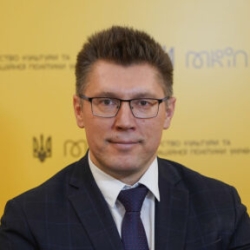Supporting Media Coverage in Ukraine
This panel of distinguished speakers shed light on the challenges faced by Ukraine's media landscape and offered solutions to empower its resurgence and meet the needs of Ukraine's democracy. Through this discussion, participants fostered a deeper understanding of the vital role media plays in Ukraine’s democracy and the significant challenges it faces post-war.
Our panel of distinguished experts engaged in a thoughtful discussion, including:
- Taras Shevchenko shared insights into the severe damage inflicted upon Ukraine's media landscape by the war. He discussed what is needed to rebuild and empower the media sector and to meet the evolving needs of Ukraine's democracy.
- Daryna Shevchenko provided a unique journalistic and management perspective on the challenges faced by Ukrainian news media both during and after the war. The Kyiv Independent served as a success story of how an independent media organization continues to play a crucial role in Ukraine's ongoing narrative.
- Marta Dyczok, a renowned expert in Ukrainian media development, provided invaluable insights into Ukraine's media challenges and offered a broader perspective on the path to recovery.
This crucial conversation offered ways to contribute to Ukraine's journey toward a more resilient, informed, and democratic future.
Recommendations to Funders:
- Flexible Funding Models: Strategic and flexible approach to supporting media outlets in Ukraine. This will allow media outlets to allocate resources based on their understanding of the needs of their audiences and communities. Consider unrestricted funding to allow media organizations to address immediate needs about their coverage.
- Capacity Building: Investing in capacity building, which includes training, modernizing, technology upgrades, and strategic planning will help media organizations become more sustainable and impactful. NGOs like the Souspilnist Foundation, Internews and IREX provide continuing education, training, and internships for journalists. The Kyiv Independent is organizing a training program to teach Ukrainian journalists how to report to foreign audiences.
Event Summary:
Impact of Russia's Invasion on Ukrainian Media: Russia’s invasion has caused significant damage to media infrastructure, with a focus on transmission towers, offices, and studios. The Ministry of Culture and Information Policy of Ukraine is cataloging the losses from Russia’s deliberate targeting of communications infrastructure, but how do you calculate the number of stories that were never written due to the disruptions caused by the war?
The concerns in the frontline areas include the inundation of disinformation from Russian outlets in frontline towns and villages. Generally, the concern of the decline of local newspapers and the impact on older readers with limited online access.
Journalists' Displacement, Mental Health, and Resilience: Many journalists are forced to leave their communities due to the invasion. The journalists who cover the war at the frontlines face physical trauma, as well as mental health trauma. Media professionals working in offices throughout the country are exposed to a daily deluge of terrifying images and stories, which results in many journalists suffering burnout from the continuous 24/7 war coverage. Ukrainian journalists showcase resilience in chronicling war crimes for future international judicial proceedings. Advocacy for individual-focused therapy services is more effective than group therapy.
Media Landscape Transformation: Ukrainian radio has experienced a resurgence, especially in frontline areas where Ukrainian TV and the internet have been disrupted. Suspilne, the public broadcaster, as well as the Kyiv Independent and Hromadske radio, are examples of Ukrainian media outlets that have successfully met the challenge of serving their audiences in wartime.
Some journalism schools need modernization and underdeveloped areas include training for media executives and financial managers. Some NGOs, such as the Souspilnist Foundation, Internews, and IREX, provide continuing education, training, and internships for journalists. The Kyiv Independent is organizing a training program to teach Ukrainian journalists how to report to foreign audiences.
Funding Challenges in Ukraine: The Kyiv Independent has been sustaining its operations through crowdfunding platforms and the direct support of its readers abroad. The situation is much more dire for media serving the internal Ukrainian market. Due to the war’s crushing blow to the economy, the advertising market in Ukraine has collapsed. Media outlets cannot rely on revenue from advertisers or subscribers in Ukraine and often must avail themselves of funding from donors. However, donors often set requirements about the specific types of topics they want media grantees to cover rather than allowing media outlets to drive the coverage based on their own understanding of the needs of the audiences and communities they serve. Also, funders might inadvertently be skewing the media market by supporting many small outlets at the expense of more viable, professional, and impactful media that would also benefit from assistance. Could donors focus more on supporting the best media and helping them grow and succeed?
In partnership with:















